A place to rejuvenate and restore your
Mind, body and soul
Imagine floating in the buoyant warm, super-salty water of the
Dead Sea
, taking a relaxing massage, and then enjoying an exquisite meal in exotic surroundings. Or, walking through stunning scenery where only the sound of the birds and the gentle breeze interrupt your thoughts. Imagine immersing yourself in the therapeutic waters of a thermal spring, sleeping under a million stars, or swimming with dolphins in a kaleidoscopic underwater world. Imagine what it would do for your overall health and peace of mind. With the full understanding that the holiday destinations of today should be more diverse, Jordan has embarked on various projects that feature a combination of both leisure and wellness, so as to ensure you enjoy a unique, in-depth, relaxing experience.
Without doubt, the world’s most amazing place, the Jordan Rift Valley is a dramatic, beautiful landscape, which at the Dead Sea, is over 400 meters (1,312 ft.) below sea level. The lowest point on the face of the earth, this vast, stretch of water receives a number of incoming rivers, including the River Jordan. Once the waters reach the Dead Sea they are land-locked and have nowhere to go, so they evaporate, leaving behind a dense, rich, cocktail of Salts and minerals that supply industry, agriculture and medicine with some of its finest products.

The Dead Sea is flanked by mountains to the east and the rolling hills of Jerusalem to the west, giving it an almost otherworldly beauty. One of the most spectacular natural spiritual and landscapes in the world, the Jordanian east coast of the Dead Sea has evolved into a major hub of both health & fitness tourism in the region. A series of good roads, excellent hotels with spa and fitness facilities, as well as archaeological and spiritual discoveries make this region as enticing to today’s International visitors as it was to kings, emperors, traders, prophets and pilgrims in antiquity.
The leading attraction at the Dead Sea is the warm, soothing, super salty water itself – some ten times saltier than sea water, and rich in chloride salts of magnesium, sodium, potassium, bromine and several others. The unusually warm, incredibly buoyant and mineral-rich waters have attracted visitors
since ancient times, including King Herod the Great and the beautiful Egyptian Queen, Cleopatra.
All of whom have luxuriated in the Dead Sea’s rich, black, stimulating mud and floated effortlessly on their backs while soaking up the water’s healthy minerals along with the gently diffused rays of the Jordanian sun.
Dead Sea Treatments
The therapeutic benefits of the Dead Sea have been known to man for at least two thousand years. A unique combination of climatic conditions and elements; sun, water, mud and air, have been proven to offer excellent natural treatments for a range of chronic ailments including dermatological problems such as Psoriasis, Atopic Dermatitis, Vitiligo and Psoriatic Arthritis, as well as for respiratory conditions such as Asthma, and for many other ailments, including Arthritis, circulatory problems, hypertension, Parkinson’s Disease and some eye problems.
The constantly evaporating waters of the Dead Sea leave behind a unique combination of
chloride salts, sulphur, sodium, potassium, iodine, magnesium, calcium and bromine:

-
Chlorine is a natural antiseptic that boosts the skin’s protective layer and reduces swelling.
-
Sulphur detoxifies and stimulates the metabolism.
-
Sodium balances the skin pH.
-
Potassium regulates the body’s water balance.
-
Iodine improves thyroid health and cell metabolism.
- Magnesium enhances functioning of skin metabolism, facilitates breathing and protects against allergies.
-
Calcium clarifies the skin surface and relieves pain.
-
Bromine is a muscle relaxant, well known for its calming effect and it is found in the air around the Dead Sea in concentrations 20 times Greater than anywhere else in the world.
Due to the high barometric pressure, the air around the Dead Sea is around eight per cent richer in oxygen than at sea level. This dry, rich, allergen free-air makes the area a haven for people with respiratory problems.
Today, thousands of people from all over the world come to the Dead Sea to rejuvenate, recover, relax and enjoy its natural benefits. A chain of world class luxury hotel and spa resorts line the coast. These provide superlative accommodation and range of treatments in their spas. The Dead Sea’s clinics specialize in the treatment of skin, joint and eye diseases as well as respiratory and hypertension problems. Each clinic has a team of senior physicians and experts and a fully-trained nursing staff.
The Dead Sea’s laboratories produce a range of facial mud masks, bath salts, shampoos, cleansers, nourishing creams, moisturizers, hand creams, make-up removers, skin toners, astringents, face washes, bath and shower gels, soaps and sun protection creams. All are produced from the area’s natural products, are of excellent quality and are available in outlets throughout Jordan or can be ordered on-line for delivery anywhere in the world, so that visitors can continue to enjoy the benefits of the Dead Sea, long after they have returned home. Dead Sea mud, or pelloid, is mineral-rich alluvial sediment, saturated with sulphide components. It holds heat well and can be smeared on the body to cleanse the skin and relieve arthritic and rheumatic pain.
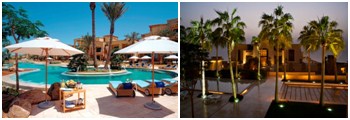
Accommodation
All of this has been enhanced by luxurious accommodation combined with the superb health and fitness facilities to be found at the 5-star & 4-star Hotels located at the area, These outstanding resorts offer world class accommodation and are perfect venues for those seeking to escape the stress and anxieties of everyday.
Perfect venues for those seeking to escape the stress and anxieties of everyday life
Situated at the most northern point of the eastern arm of the Red Sea, the delightful seaside resort of Aqaba is the perfect location for health and leisure activities. Here, the Red Sea itself with its beautiful reefs, teeming with amazing underwater life provides the main attraction. Scuba diving, snorkeling, swimming, sailing, windsurfing, water-skiing, or just chilling out on the beach, are only a few of the ways to relax and restore both body and soul at Aqaba. The water is warm, the weather is perfect and the facilities are second to none. Well equipped spas, fitness centers and gyms are featured in Aqaba’s leading hotels and resorts, as are swimming pools and tennis courts. The town also offers numerous health and sports clubs. There are numerous hotels in Aqaba from five star to economy as well plenty of shops and restaurants all catered towards the tourist crowd and dedicated to making your stay as tranquil and relaxing as possible.
The Gulf of Aqaba has the world’s northernmost coral reef ecosystem
New horizons in adventure tourism allow visitors to push themselves to new levels of adventure...
PETRA - A Wonder of the World
The entire area around the site of Petra offers dramatic and varied landscapes. The canyons are a maze of wind-sculptured rocks, tiny meandering tracks and secluded valleys, where the only sound is the tinkling of goat bells or the reedy notes of a shepherd’s flute. It is, in effect, an adventurer’s playground. This is a great place for walking, trekking, horse riding and climbing. Although some activities are not permitted within the site itself, there are plenty of great locations in the area. If you’ve explored all there is to see in Petra itself and you still have energy for more, head down the wadi to Little Petra.
To visit Petra during daylight is awe-inspiring; to experience it at night by the light of 1,800 candles is truly an out-of this-world experience! Walk through the Siq to the
Khazneh (Treasury) following a candlelit path and enjoy the haunting music of the Bedouin at the Treasury. Tours run 3-times a week on Monday, Wednesday and Thursday; they start at 8.30pm and finish at 10.00pm.
Do you fear heights? Don't think to try
Climbing to the heights of Petra cannot forget, whether you're a lover of climbing, or an ordinary climber Petra will inspire you, the highest mountain is 1,350 meters (4,429 ft.) above sea level.
Wadi Rum - Enjoy pure nature & silence
Is a place of dramatic beauty which provides an ideal environment for Climbing, Hiking, Trekking & Camping.
It is one of the most rewarding ways of discovering the land, mountains, canyons, sand dunes and learns about the Bedouin who inhabit these arid lands.
This kind of adventure offers a real treat for all of your senses, giving you a well deserved break away from the hustle and bustle of city life. Standing amid this wonderful landscape where the red rocks rise up to meet the deep blue sky, the illusion of Wadi Rum will soon work its magic on you!
When climbing on the Mountains You will usually be following routes which have been used by generations from the Bedouin hunters and shepherds. The Bedouin guide will carry a climbing rope, which may be used on exposed sections to reassure group members who are not confident scramblers.
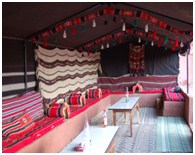
These journeys made on foot involve the support of a trek crew to carry personal belongings, along with food and cooking equipment. You will camp each night under the stars. An experience you will never forget. Step out of the ordinary and spend a night at a Bedouin Camp. With this an overnight stay is an unforgettable experience that includes authentic Bedouin music, dance, and delicious local cuisine. While sleeping-just feel free to sleep under the stars on comfortable mattresses.
For experienced rock-climbers there are climbs reaching 1,800 meters, varying between Grade 3 and 5 in difficulty. The rocks are sandstone and excellent climbs are possible, often exceeding the quality and length of those in places such as the Italian Dolomites. Climbers must enquire in advance, as climbs are restricted and must be accompanied by an experienced Bedouin guide. Although a common way to
explore Wadi Rum is by 4x4 vehicles, many of the more secluded areas are inaccessible to vehicles. Camels offer a more authentic and eco-friendly mode of transport, along with horse-riding. Camel and Horse Caravans can be arranged.
Because of its unique ecosystem, Wadi Rum is a great place for bird watchers. A route for bird migration, spring and autumn are the best times of the year to spot a great number of different species either nesting in the rock faces or soaring on the thermals high above the cliffs. Vultures, eagles and other larger species of birds can often be seen here too. A good pair of binoculars is a must. Night walking in Wadi Rum during the summer months is a surreal experience but not for the fainthearted. Only experienced walkers should undertake this activity as it is easy to become disorientated in this vast wilderness
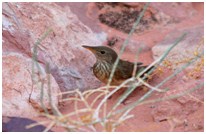
Bird Watching
In Jordan are a lot of rare species of birds to see (in total 374) as the kingdom is located at the crossroads of migrating birds from Europe, Asia and Africa. Therefore best travel time for bird watchers are spring and winter. In Jordan are existing 17 Important Bird Areas, where you can see Squacco Herons, Egrets and Marsh Harriers, Temminck's Horned Lark, Desert Lark, Hoopoe Lark, Desert Wheatear and Trumpeter Finch; in winter also Cranes and Imperial Eagles and Thick-billed Lark. In Wadi Rum, Mujib and Petra the one can watch Griffon Vulture, Bonelli's Eagle, Blackstart, Scrub Warbler and Sinai Rosefinch; at Dead Sea area and
in Wadi Araba the Sand Partridge, Bar-tailed Lark, Dunn's Lark, Little Green Bee-eater, Blackstart and Arabian Babbler. The eco-system of Wadi Rum holds many rare and endemic plants. Spring reveals hundreds of species of wild flowers. About 120 bird species have been recorded in the area, including the Griffon Vulture, the Fan-Tailed Raven, Bonelli’s Eagle, and Hume’s Tawny Owl. Baseline surveys show the existence of the Grey Wolf, Blandford’s Fox, the Sand Cat, and Ibex within the area.
Climbing
aboard a hot-air balloon is another unforgettable way to view Wadi Rum. Ballooning trips are available from April to June and September to December. The balloons carry up to eight passengers and lift off early in the morning. You feel you are in a different planet. The beautiful moonlike landscape is absolutely breathtaking. Feel the joy on Hot Air Balloon lasts up to an hour and a half (depending on conditions - minimum 45 minutes).
Everywhere are breathtaking panoramic views and a sense of deep tranquility
MUJIB NATURE RESERVE
Grab a lifejacket and take the plunge. The river is your only path as you trek uphill from the Dead Sea through the narrow, 50 meter high walls of the Wadi. Your guide will take you through a series of cascading waterfalls, each more challenging than the one before. For those who appreciate Mother Nature and the thrill of the outdoors, a hike through the Wadi system may prove to be a challenging exercise to rejuvenate the body as well as the mind. Mujib has five major trails, three river trails and two dry land trails – all of which offer some of the most dramatic hiking in the Kingdom. The RSCN offers many different adventures in Mujib, the lowest nature reserve in the world. Its most extensive trek is known as the ‘Lost Trail to the Dead Sea’, a full day expedition that descends from the rugged highlands above Mujib, down to the Dead Sea. Not for the fainthearted!
The lowest altitude Nature reserve in the World
The Mujib reserve extends to the Karak and Madaba mountains to the North and South, reaching 900m above sea level in some places. This 1,300m variation in elevation, combined with the valley’s year-round water flow from seven tributaries, means that the Wadi Mujib enjoys a magnificent biodiversity that is still being explored and documented today. Both adventure and comfort can be found at the Mujib Nature Reserve. You can explore the Reserve on foot, using several hiking trails, which is linked by a high-level metal catwalk to the Mujib River.
Wondrous Wildlife
The year round water presence in the valley due to the inflow of seven tributaries, combined with the elevation difference and the remoteness of many of the Reserve’s mountain and valley areas, have created and enabled a safe environment that supports a magnificentbio-diversityofwildlife.Over420 species of plants, 102 species of migratory birds, and ten species of carnivores (Red fox, Bland ford fox, Hyena, Jackal, Wild cat, Caracal, Badger, Mongoose, Wolf and Arabian Leopard) have been recorded to date. Two very distinctive living beings that make Mujib their home are the Ibex and the Caracal. The Nubian Ibex, whose numbers had dramatically declined in easily accessible areas, due to over-hunting, are now part of a captive-breeding programme established by the RSCN in the Mujib Reserve. The areas sandstone cliffs make an ideal habitat for this beautiful mountain goat. The Caracal, a medium-sized cat distinguished by its black and white ear tufts, can be spotted in action in the rocky valley of Mujib. This agile and powerful hunter uses its amazing jumping power to catch airborne pray.
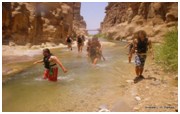
Hiking Trails
There are five major hiking trails; three river trails and two dry land trails. They offer some of the most dramatic hiking in the Kingdom. The river trails are for adventure seekers, who should be fit and able to swim.
Jordan - Nature’s best-kept secret
Be in touch with nature. Be in touch with yourself.
Enter the world of Eco-Jordan
Jordan is a country of outstanding bio-diversity. It is a land that encompasses all, from pine-clad mountains, lush green valleys, wetlands and oasis to the breathtaking desert landscapes of Wadi Rum and the kaleidoscopic underwater world of the Red Sea. Undoubtedly Jordan’s most important and impressive ecological treasure is the unique area along the eastern coastline of the Dead Sea. Here, 410 meters below sea level, many small streams flow down from the surrounding hills, their mineral-rich waters creating gushing waterfalls and an amazing diversity of flora and fauna. Here too, are hot thermal springs, their health-giving waters having attracted visitors for thousands of years. On the Dead Sea coast nature has taken simple salt, fashioned it into impossible sculptures and imbued them with colors’ of unbelievable vividness.
The people of Jordan are aware of their rich natural heritage and go to great lengths to protect it and ensure its continued wellbeing. For this reason, several large nature reserves have been set up and are professionally run, in order to minimize negative impacts on the natural habitats and rare species of Jordan’s flora and fauna.

DANA NATURE RESERVE
There are a number of hiking trails to key points of interest for both casual and dedicated hikers.
Dana Nature Reserve is a world of natural treasures covering 308 square kilometers. A chain of valleys and mountains extending from the top of the Jordan Rift Valley down to the desert lowlands of Wadi Araba, the Reserve contains a
remarkable diversity of landscapes, ranging from wooded highlands to rocky slopes and from gravel plains to dunes of sand. Guided hikes offer visitors the chance to learn about the geology, wildlife, and history of Dana in person. Camping facilities are available at the Rummana campsite – visitors should be aware that camping is not permitted outside of this area
Dana is an unparalleled haven of peace and tranquility and an extraordinary world of natural treasures
It is an experience that defines the meaning of the phrase, ‘going back to nature’. Here you can meditate amid the quiet stillness of the mountains, sleep under the stars, enjoy fresh air and cooling breezes, or tracks the footprints of the marvelous wildlife endemic to this terrain. Dana offers a vast diversity of landscapes; there are wooded highlands, rocky slopes, sand dunes and stony deserts. There is a whole wilderness to explore and a variety of flora and fauna to be discovered. Moreover, visitors have the opportunity to meet and get to know the native people of Dana; the kind and hospitable Ata’ta tribe, who have made this their home for the past 400 years, continuing the tradition of settlement in the area that began more than 6000 years ago.
The Nature Reserve covers the beautiful sites of the Rummana Mountain, the ancient archaeological ruins of Feynan, the Dana village, and the sandstone cliffs of Wadi Dana. It is home to 703 species of plants, 215 species of birds, and 38 species of mammals.
Accommodation
Guests have a choice of three types of accommodation: the Feynan Lodge or the Rummana Campsite or the Dana Guest House.
SHAWMARI WILDLIFE RESERVE
The Shawmari Wildlife Reserve is designed to be an attractive location for school trips and family outings. The 22 square kilometer Shawmari Reserve was created in 1975 by the RSCN as a breeding centre for locally extinct or endangered species. It has developed into a home to some of the rarest species of animals in the Middle East. These animals are now reasserting their presence, protected from habitat destruction and hunting. The oryx and onagers (Asian wild ass) roam freely in their large desert grassland enclosures, and ostriches and gazelles can be observed in their fenced-off areas. The Reserve, which follows breeding programmes with a number of the world’s leading wildlife zoos and parks.
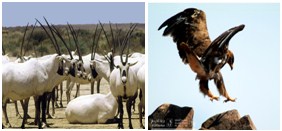
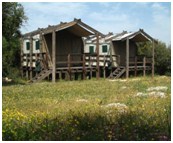
AJLUN NATURE RESERVE
It is an area of hills covered by dense woodlands of evergreen oak, interspersed with pistachio, carob, and strawberry-trees. The Ajlun woodlands are typical of the original forest cover of Jordan. For centuries they have been important for local people for their wood, scenic beauty, and quite often for medicine and food. The forest still supports many woodland mammals, including herds of wild boar, foxes, and the occasional wolf and hyena. Typical woodland birds are also numerous, especially the raucous, strikingly coloured jays, which feed on the acorns of the editerranean oaks. In spring, the woodland floor is carpeted with drifts of multi-coloured anemones, rockroses, and a host of other wild flowers. The Reserve is home to a herd of breeding
roe deer. It is hoped this herd will be released into the forest in the near future to replace the original population, which became extinct because of excessive hunting.
AZRAQ WETLAND RESERVE
Azraq is a unique wetland oasis in the heart of the semi-arid Jordanian desert. Is a perfect location to bird watch, especially during the migration seasons when a wide variety of birds stop for a rest during their arduous trip between Europe and Africa. Some birds stay for winter or breed within the protected area of the wetland. The attractions of the Reserve include several natural and ancient built pools, a seasonally flooded marshland, and a large mud flat known as Qa’al-Azraq. From the Azraq Eco-lodge, a wide range of activities is possible.